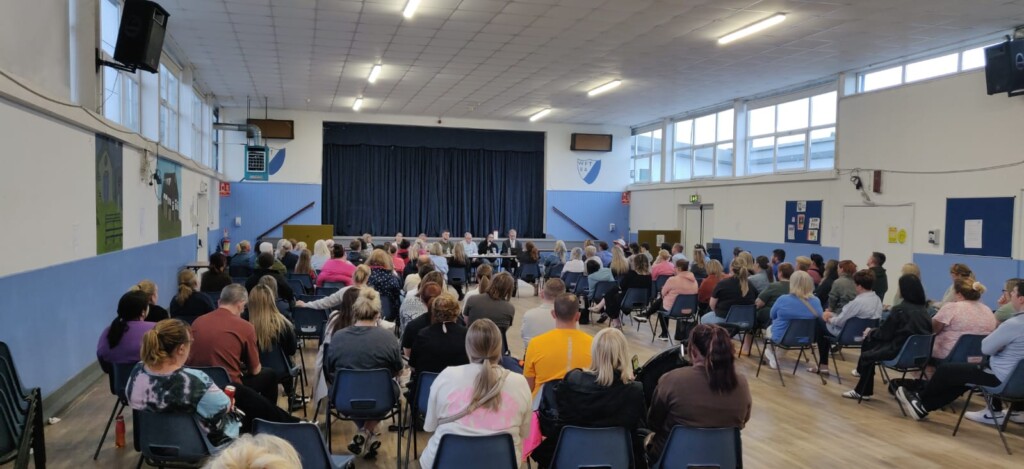The new school year has resulted in the same old problems for children with intellectual disabilities and their parents.
In May, Northside People ran a series of articles that exposed serious issues with funding and a lack of school places for neurodivergent children, children on the autism spectrum or those with learning disabilities; with schools returning across the country next week, the report card of “much improvement needed” has gone unheard.
A public meeting was held in Finglas on Monday, August 19, which highlighted the scale of the issue in the area.
120 people attended the meeting in the WFTRA Hall in Finglas, with People Before Profit councillor Connor Reddy chairing the meeting.
IBEC reports of Ireland being near full employment and enjoying economic growth meant very little to the people attending the meeting.
The meeting heard from Greg Lewis a co-founder of the Equality in Education campaign for Dublin North West.
Lewis is the father of a 13-year-old boy named Sam, who is non-verbal and autistic..
Lewis said “I won’t be backing down until my son and others like him have school places and all the supports they deserve”
“As a parent and an SNA, it’s heartbreaking to watch children struggle due to the system’s failures. We’re not asking for anything extraordinary—just the basic supports our children need to thrive. This fight isn’t just for my son; it’s for every child who has been let down by this broken system.”
A protest was held outside the Dáil on Friday, August 23 outside the Dáil as the parents looked to bring the issue to a wider audience.
“Parents like me all over the country are at our wits’ end. We are fed up of empty promises and failure by the NCSE, Ministers and Government.”
“Until now we’ve fought in silos, area by area. The key to getting a school place for Sam this September is to escalate political pressure on the government. We have decided to come together with other parents and groups to make a unified stand and will continue to escalate if we have to. We will not allow our children to be left behind” Lewis said.
Rachel Martin, founder of Families United for Services and Supports Ireland (also known as FUSS), said that there is an element of a “postcode lottery” when it comes to securing supports for children with intellectual disabilities.
Martin said there is a “significant” shortage of health and social care professionals in Ireland, with a national average staff vacancy of 36%, or 800 unfilled posts.
Martin highlighted recruitment and retention challenges are exacerbated by pay disparity, competitive international opportunities, high caseloads, and increasing levels of burnout among staff.
“This, coupled with chronic underfunding, directly affects the capacity of services to meet demand, leading to lengthy waiting times and inadequate therapeutic supports for over 55,000 disabled children,” she said.
“The challenges facing children’s disability services in Ireland are significant and require ongoing attention from policymakers, healthcare providers, and educators. The key to overcoming these challenges lies in transparency and accountability in a fractured and complex system as well as sustained investment, improved resource allocation, effective recruitment and retention strategies for skilled professionals, and a commitment to ensuring equitable access to services for all children, regardless of diagnosis or postcode”.
Caitriona of Dublin 15 School for All said “parents from Dublin 15 have been campaigning for appropriate school places since early May. We have already held numerous protests to highlight our campaign and the struggles that we have faced in securing an appropriate school place for this coming September. The reality of the issue is much larger than Dublin 15 so we stand with Equality in Education Dublin North West to try and raise more awareness of this issue with a goal to reach nationwide.
In June, a similar protest was held outside the Dáil by Dublin 15 School For All which resulted in a meeting with Minister Hildegaarde Naughton and various departments from the Department Of Education.
The meetings did not result in any resolution.
“Each child has been personally named in the Dail, we have had to share our children’s faces all over social media, talk on national radio and talk to news reporters,” she said.
She said that the government has done the “bare minimum” on resolving the issue.
“There are still 19 children in Dublin 15 who have yet to secure an appropriate place after our long campaign. Our numbers have increased instead of decreasing since we started our campaign. A further six children who had thought they had secured a place only to be told this week that the work will not be completed for a further 10 – 12 weeks.”
“How is this acceptable? What more do parents have to do in order to secure what is a legal right; a right to an education. We are saying enough is enough, we want answers now and we want the government to be held accountable for their failings of our children.”
Despite Dublin West being the Dáil seat of a former Taoiseach, a Green Party leader and Minister that is in charge of disability among his ministerial briefs and the new Fianna Fáil Minister for Finance, the supposed benefit of having direct access to the halls of power is not translating to the people on the ground.
This week, local Social Democrats TD Gary Gannon said that Minister for Education Norma Foley was “distracted” by her bid to ban mobile phones from secondary schools, while Labour Castleknock councillor told Northside People in March that the current system of special needs education in Ireland is “fundamentally broken.”
